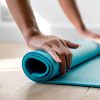Yin yoga, based on the Taoist theory of complementary and opposing principles in nature, involves a series of passive, long-held poses that primarily focus on the lower part of your body. The practice loosens stiff connective tissue or fascia, which are richly found in the inner thighs, lower spine, hips and pelvis.
With each pose lasting up to 5 minutes, the benefits of yin yoga are far beyond better flexibility. Some key benefits of performing yin yoga include:
1. Makes You More Resistant to Stress and Anxiety
In yin yoga, you have to hold a pose for several minutes at a stretch. This can be an anxiety trigger for some people. Luckily, the human body is a remarkable amalgamation of tissues, organs and systems that are designed to acclimatize to any given situation. When a yin yoga pose is performed with gentleness, it can teach the body to adapt.
Surrendering yourself is a key facet in yin yoga. When you’re holding a yoga pose for prolonged periods, you have to give up the need to control, which is an ability you can take with you in your everyday life. Being able to adapt to the challenges and successes in life can help you tolerate change with elegance, thereby effectively reducing your tendency to get stressed.
2. Allows You to Meditate
Yin yoga doesn’t involve many dynamic, fast-paced movements that will keep you occupied throughout an entire class. In fact, you may actually find yourself with plenty of time in your hands while practicing yin yoga. In today’s rollercoaster lifestyle, it’s easy to forget that being busy is not a good thing. We have this constant urge to either multitask or be involved in a perpetual mental dialogue.
Yin yoga incorporates a gentle meditation practice to help calm your mind and slow your breath. Your instructor will guide you through the process, providing ways to stay focused and inhibit your mind from wandering.
The following are some scientifically proven benefits of meditation:
- Alleviates stress and anxiety, according to research published in Brain, Behavior and Immunity.
- Boosts immune system function, according to research published in Psychosomatic Medicine.
- Increases the volume in certain regions of the brain, responsible for positive emotions, emotional control and self-control, according to a study in NeuroImage.
- Increases your ability to be more productive, according to a study published in the journal, Cognitive, Affective & Behavioral Neuroscience.
3. Boosts Immune System Function
According to a study published in PLoS ONEthat looked at the impact of 5 minute stretches, the mechanical input via static tissue stretches may have anti-inflammatory and anti-fibrotic effects in the body. Therefore, performing yin yoga and engaging in 5 minute stretches can help improve your body’s immune system response, while reducing any fibrotic limitations during movement.
4. Triggers Myofascial Release
Long held stretches stimulate myofascial release of tension. Research indicates that the lower the stress and the longer the duration, the better the healing response. This is similar to yin yoga, except it doesn’t require you to get as deep as possible, but to a position where you feel sufficiently challenged.
Myofascial release helps relieve tension in the fascia and tendons through an external mechanical load, thereby helping your body stretch its collagen fibers and increase its healing response.
Furthermore, myofascial release lengthens your fascia and underlying soft tissue, alleviating regions of reduced fascial movement. According to a study published in the Journal of the American Osteopathic Association, myofascial release can lead to pain reduction, increased range of motion and enhanced physiological function.
5. Increases Hyaluronic Acid
Performing yin yoga regularly improves joint health and increases hyaluronic acid production in the body. Hyaluronic acid (HA) is a large, hydrophilic (water-attracting) molecule that binds with water and ions. Found in the space between your bones, HA can hold up to 10 times its weight in water and plays a role in keeping your joints lubricated. When the joints are well lubricated, they are less likely to grind against each other and cause pain and inflammation as a result of friction.
The post 5 Reasons You Need Yin Yoga in Your Life appeared first on YOGAGATI.


